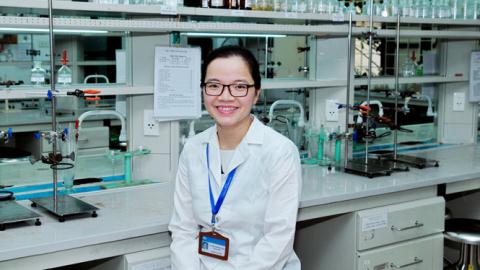
After seven years of research, a female Vietnamese scientist has discovered a new transmitter to help prevent Alzheimer's.
 |
| Dr Tran Thi Phuong Thao. |
After seven years of research, a female Vietnamese scientist has discovered a new transmitter to help prevent Alzheimer’s.
Dr Tran Thi Phuong Thao, 33, a lecturer at Hanoi Pharmacy University, received the L’Oreal National Fellowship for Women in Science.
Thao said Alzheimer’s causes memory impairment, gradually occurs over time, and has impact on all functions of the brain.
To date, scientists still have not found the cause of the disease, and there is no cure. The drugs prescribed by physicians for Alzheimer’s patients are for symptomatic treatment only.
Thao said she dreams of finding a substance to prevent risks that cause the disease.
Her work began in 2011 when she was in South Korea as a PhD student. After obtaining her doctorate, she returned to Vietnam and continued her study. She found some transmitters that can prevent risks.
“If the pre-clinical tests bring desired effects, the possibility of finding drugs to treat Alzheimer’s is very high,” she said.
There is no official research about Alzheimer’s development in Vietnam, but scientists believe that the number of patients, especially among the old, is on a rapid rise.
“The disease has very serious effects on patients’ life quality, so I am dying to find drugs to treat it,” she said.
At the age of 33, Thao’s hair has become white because she usually keeps vigil to do study and experiments. “Sometimes I leave the laboratory when it is morning,” she said.
As Thao spent most of her time on study, she had her first baby when she was over 30, five years after marriage.
She’s still busy with scientific research, so she has to leave the child with her parents. Every day, after teaching at the Pharmacy University, Thao goes to the laboratory.
When asked about her desire, she said she wishes one day had 48 hours so that she can do more work.
Thao’s research on developing the new transmitter that inhibits Glutaminyl cyclase enzyme aims to treat Alzheimer’s. If successful, this will have special significance as the disease is expected to increase in coming decades, when Vietnam will have an older population.
Thao has had 12 scientific articles published in SCI journal.
In related news, Vietnam is the 57th among 163 surveyed nations in the recent Nature Publishing ranking in scientific research. The Vietnam Academy of Science & Technology tops the list of Vietnamese research institutes, followed by universities. Among universities, Ton Duc Thang is in the first position, followed by the HCM City National University and HCM City University of Education.
(Source: VNN)





